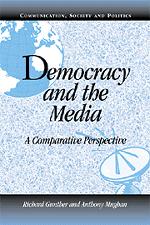Book contents
- Frontmatter
- Contents
- List of Contributors
- Acknowledgments
- 1 The Media in Democratic and Nondemocratic Regimes: A Multilevel Perspective
- 2 The Media and Politics in Spain: From Dictatorship to Democracy
- 3 Institutional Incapacity, the Attentive Public, and Media Pluralism in Russia
- 4 Democratic Transformation and the Mass Media in Hungary: From Stalinism to Democratic Consolidation
- 5 The Modernization of Communications: The Media in the Transition to Democracy in Chile
- 6 Media Influence in the Italian Transition from a Consensual to a Majoritarian Democracy
- 7 The United States: News in a Free-Market Society
- 8 Japan: News and Politics in a Media-Saturated Democracy
- 9 The Netherlands: Media and Politics between Segmented Pluralism and Market Forces
- 10 Great Britain: The End of News at Ten and the Changing News Environment
- 11 Germany: A Society and a Media System in Transition
- 12 The Political Impact of the Media: A Reassessment
- References
- Index
8 - Japan: News and Politics in a Media-Saturated Democracy
Published online by Cambridge University Press: 05 June 2012
- Frontmatter
- Contents
- List of Contributors
- Acknowledgments
- 1 The Media in Democratic and Nondemocratic Regimes: A Multilevel Perspective
- 2 The Media and Politics in Spain: From Dictatorship to Democracy
- 3 Institutional Incapacity, the Attentive Public, and Media Pluralism in Russia
- 4 Democratic Transformation and the Mass Media in Hungary: From Stalinism to Democratic Consolidation
- 5 The Modernization of Communications: The Media in the Transition to Democracy in Chile
- 6 Media Influence in the Italian Transition from a Consensual to a Majoritarian Democracy
- 7 The United States: News in a Free-Market Society
- 8 Japan: News and Politics in a Media-Saturated Democracy
- 9 The Netherlands: Media and Politics between Segmented Pluralism and Market Forces
- 10 Great Britain: The End of News at Ten and the Changing News Environment
- 11 Germany: A Society and a Media System in Transition
- 12 The Political Impact of the Media: A Reassessment
- References
- Index
Summary
Two related questions lie at the heart of the mass media's relationship to democracy in postwar Japan. The first is why the medium of television for most of the postwar period seems to have had less impact on politics in Japan than in many other industrialized democracies. I shall argue that television until recently only complemented, not supplanted, newspapers as the important medium of political communication in Japan; that its primary role had been the conservative one of reinforcing authority and dampening conflict; and that it had only a limited impact on elections and political leadership. Newspapers, in contrast, contributed more to promoting democratic norms, providing a check on those in power, and setting the political agenda. Further, I will argue, understanding the differences in the development and function of these mass media in post–World War II Japan will also help explain one important and distinctive characteristic of postwar Japanese democracy; why for most of the postwar period the mass media's enormous influence did not seem to lead to greater political instability. Speaking from the vantage point of the early 1990s, the efforts of the American Occupation (1945–52) to establish democracy, including a free and thriving fourth estate, were clearly successful. A central paradox of Japanese political development, however, has been that the extensive mass media penetration of society led to a citizenry that was politically highly informed, involved, and cynical, while the larger political system remained quite legitimate and stable.
- Type
- Chapter
- Information
- Democracy and the MediaA Comparative Perspective, pp. 266 - 302Publisher: Cambridge University PressPrint publication year: 2000
- 9
- Cited by



